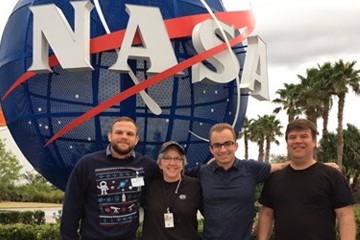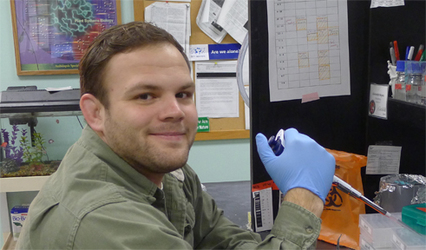
04/06/2020
Ohio University scientist Alex Meyers ’13 was working on an important experiment with NASA when his university chose to move to distance learning in response to the novel coronavirus (COVID-19) pandemic, which meant he no longer had regular access to his laboratory.
So Meyers decided to take matters into his own refrigerator, maintaining experiments on a shelf below his leftovers.
Nearing completion of his Ph.D. studies in molecular and cellular biology at Ohio University in Athens, Ohio, Meyers is studying how plants grow in low-gravity environments. NASA’s astronauts will run Meyers’ tests on board the International Space Station next year. It will be the third time Meyers, SUNY Cortland’s first biochemistry major, has participated in an experiment done in space.

“It’s a difficult thing to study here on earth because we can’t get rid of gravity,” Meyers said. “We can do experiments where we turn plants on their side or something like that. But the way to really have that control experiment where we eliminate gravity is to go to orbit.”
The challenge for Meyers is building an experiment that conforms to NASA’s restrictions for size and weight while also removing the chance of error on the part of the astronauts.
Using seeds of Arabidopsis thaliana, a small, flowering weed frequently used in biology experiments, Meyers is crafting pre-watered plates that hold the seeds and can be placed under grow lights on the space station. It’s an ingenious solution and doesn’t require an astronaut with a green thumb.
The trick is keeping the seeds from germinating before they’re in orbit, which would throw off Meyers’ results.
His solution is temperature control. The seeds will be watered on the plates one day before they are placed on the rocket bound for the space station. It takes about three days for the rocket to connect with the station and it might be another 24 hours before an astronaut can place the plates under the grow lights. But if Meyers can keep the seeds cold enough for long enough, he can prevent germination before the experiment is ready.

When Ohio University announced it was suspending in-person instruction on March 13, Meyers knew he was no longer going to have regular access to the cold room in the university’s laboratory. So he stuck his work on the bottom shelf of his refrigerator, underneath cartons of eggs and some salad. His apartment has become a plant-filled germination lab.
He’s since upgraded his refrigeration equipment and has continued the work.
“My advisor, Dr. (Sarah) Wyatt has a minifridge in her office for her lunch and she offered that up to me,” Meyers said. “We think it’s better to keep the science in its own fridge.”
This is Meyers’ third experiment with NASA through his studies at Ohio University. A prior study in 2018, also on plant gravity perception, formed the basis of his Ph.D. dissertation, which he defended on Feb. 28.
His current research is scheduled to go to space sometime in 2021.
Working with NASA has been rewarding for Meyers and it’s also given him an appreciation of how to design projects where there is little room for error.
“It’s fun and it’s stressful,” he said. “It’s unlike most experiments. There’s a lot more science on the front end. Usually when you run an experiment, you try it and if something didn’t work, you try it again. Sometimes things don’t work until they work. But when you’re sending things to space, you really only have one shot. It’s a lot of testing on the ground to make sure everything is perfect before you send it up.”
Meyers has accepted a post-doctoral position at Ohio University and he may take another post-doctoral role or take a faculty position in a few years.
It’s no surprise Meyers has succeeded in research. He was SUNY Cortland’s first student to graduate from the biochemistry program that was created in 2012. During his time as an undergraduate, he worked with biological sciences Professor Patricia Conklin investigating how plants produce vitamin C.
“In academia you meet scientists from all over who graduated from all of the top schools,” Meyers said. “I never felt like I’m less prepared to be in the position I’m in than anybody else. Cortland did a great job preparing me even as the first biochem graduate.”